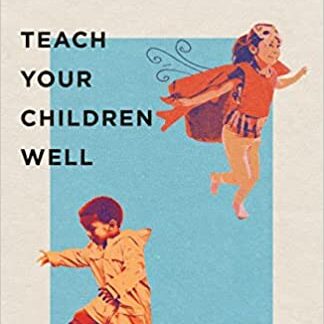Sarah Cowan Johnson
I will own the fact that I find human development and pedagogy fascinating. They are not your everyday interests, but I can find people that share them and have conversations about what we’ve noticed, what we’ve read, and what we’ve done in our professional lives. I also love discussing faith formation at all developmental stages. This is a bit more of a specialized niche, but I can still find people that find that fascinating. But when I start letting people know that I have major thoughts about discipleship pathways, particularly ones that intentionally examine how we can best support families on their journeys, I usually hear crickets. When Teach Your Children Well by Sarah Cowan Johnson landed on my stoop from the publisher, I did a double take and a little jig. It turns out I have a kindred spirit in Rhode Island that has spent a lot of time researching and processing just such a topic.
Teach Your Children Well is organized into twelve chapters. The first several chapters lay out the why we need to pay attention to how our children are discipled and who is doing so with what motives. The middle chapters get into the stages that humans go through as the grow and mature. It is organized by age levels, but if you live with people that do not follow a typical growth trajectory, the information still applies. You just need to look at how your loved one is developing. (My household includes my middle aged sister who has Down Syndrome. These chapters still apply.) The last chapters give you concrete examples of how you can effectively and compassionately partner with God and support your loved ones as they grow deeper roots and mature into the people God calls them to be. The author weaves research and real life examples into her writing, peppers the chapters with ideas you can implement into your daily rhythms, and bolsters adults in the important work of being the primary leaders for their children’s faith formation. The author and I may use some different language for stages and processes of human spiritual development, but the essence remains true; adults have a sacred and important partnership with God to make sure children know God, truly love God, and know how to attend to and live alongside God.
There are so many ways that you can use this resource. You can use this as a book club study in an adult faith formation class. Yes, this can be used with adults that are in the process of raising children, but imagine the power of using it as a study with adults that are in charge of designing effective faith formation ministries in your congregation. This book could bring their visioning to the next level. I would keep a copy of this in our resource library so people could borrow and read as they please, but it also belongs on my personal resource shelves so that I can refer back to it as I go about planning effective faith formation ministries. You can lift several of the ‘steal this idea’ and turn them into a multigenerational faith formation time. Several would also make lovely care packages, sent home with all the materials. There is something for everyone in this resource and I think those that care deeply about the future of Christianity would do well to spend time with this resource.





0 Comments